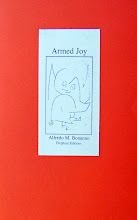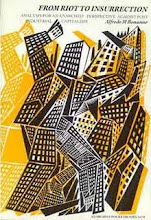Many comrades produce solidarity in the way that bald people produce lice. They do so in great quantity, in every way, towards all those
needy of tokens of solidarity: the persecuted, the oppressed, the meek, the disabled, towards all those who have been or are about to be
deprived of something.
It’s not true that giving solidarity is cheap, as some malicious minds would have it, saying it in whispers of course. On the contrary it has
a price, it costs a lot, it costs in terms of effort, early rising (a little) to get to the physical places where the abuse is committed, late
nights (many) passed discussing how to organise oneself in the most opportune way to assist and help every kind of needy person.
Revolutionaries with the candid souls of Clarissa nuns in nurses’ uniforms gradually wither away, growing old and fat in the shadow of
these assistential procedures without deflecting an instant. Now one can see them day and night attached to their cell phones in
conversation with other social workers of every species to better produce solidarity, uninterruptedly, without perplexity, without any
doubt. The specialisation does not dishearten them, on the contrary it reconfirms their lives.
Life, seen as a whole, and therefore in a reduced and simply paradigmatic framework, oscillates between doing and acting. The first
position is stable, temporalised, garantor of a certain albeit incomplete consciousness, gratifying, even if in the long run it produces
habituation to stupidity. The second is uncertain, provisional, clear of stable and prefixed positions; it is fragmentary and discontinuous,
happens and makes happen in a non temporal point.
Now, for a long time – even too long – we have been asking ourselves what we should mean by solidarity. A declaration of intent? A
recognition of the situation of distretta in which someone is to be found? A communiqué concerning the repressive organs that the object
of repression is not alone but finds at his side ourselves trained combattants devoid of common goals but all ears in picking up every
raising of the truncheon?
I understand that some comrade can find himself in the objective and circumscribed situation of being faced with specific repressive
situations that touch the heart. I also understand that many comrades of a tender heart almost, almost draw these situations upon
themselves like magnets operating if not exactly life choices at least choice of field.
But revolutionary solidarity is something else.
Let us try, for the nth time, to clarify the problem.
I think, for the love of argument, that it is possible to hypothesize two situations: solidarity that I mean to give to the excluded in general
and that which I intend to give to the comrades struck by the repression. It might seem like the same thing but it is not. Concerning the
first I can denounce the repressive processes but my primary aim cannot stop there, it must go beyond that, I must that is try to
organise the excluded in question to realise along with them an attack against the instruments and men that this repression realises.
Concerning the second my revolutionary solidarity can only consist in continuing the revolutionary project for which the comrades were
struck by the repression.
It is clear that in both cases the initial moment of the solidarity is only a passage, even pleonastic if not merely secondary, to moving to a
successive moment. In the case of the excluded in general it has the aim, not as an end in itself, of making myself known to present the
organisational project, this yes of a revolutionary nature. In the case of the comrades simple solidarity is almost counterproductive if my
real aim remains that of continuing their project, because it could jeopardise precisely this continuation, making publicly known a sharing
of intent that it is not always useful to bring to the attention of repression. It goes without saying that if I do not agree with the project
of the comrades under attack by the repression I am not prepared to give them my solidarity at all, which would merely be a banal
manifestation of my existence on my part (here I am: I’m here, I exist too) and would have nothing revolutionary about it.
For many, contrary to what is suddenly being exposed here, solidarity is a covenient drawer in which to put one’s daily misery. In this way
being in solidarity with whoever ends up in prison (Stalinists included) becomes a sport to carry out full time, with the worthy result of
feeling oneself alive and useful for something.
Improbable musical groups, frequenters of taverns, Sunday picnickers, meet up with rhythms worthy of greater things and assist all those
who raise a hand to ask for help: prisoners and migrants in the first place, these two sectors are practically inexhaustible.
And so on.
Many comrades produce solidarity like bald people produce lice. They do so in great quantity, of every kind, towards every kind of needy
of tokens of solidarity: the persecuted, the oppressed, the meek, the disabled, towards all those who have been or are about to be
deprived of something.
It’s not true that giving solidarity costs little, as some malevolo pensante maintain, trying however to say it quietly, on the contrary it has
a price, it costs a lot, it costs in terms of effort, of levatacce (little) to get to the physical places where the prevarication is consumed,
of seratacce (many) passed discussing how to organise oneself in the most opportune way to assist and help every kind of needy person.
Revolutionaries with the candid souls of Clarisse sisters in nurses uniforms are gradually sfioriti getting old and fat in the shadow of these
assistential procedures without deflecting one instant. Now one can see them day and night attached to their cell phones in conversation
with other social workers of every pelo to better produce solidarity, without interruption, without perplexity, without any doubt. The
specialisation does not avvilisce them, on the contrary it reconfirms their lives.
Life, seen as a whole, and therefore in a reduced and simply modulistic paradigmatic framework, oscillates between doing and acting. The
first position is stable, temporalised, garant of a certain consapevolezza seppure incomplete, and gratifying, even if it produces alla lunga
assuefazione alla stupidity. The second is uncertain, provisional, sganciata from stable and prefixed positions, fragmentary and
discontinuous, accade and fa accadere in a non temporal point.
Now, for a long time – perfino too long – we have been asking ourselves what we should mean by solidarity. A declaration of intent? A
recognition of the situation of distretta in which someone is to be found? A communiqué concerning the repressive ente that the object of
repression is not alone but finds at his side ourselves agguerriti combattents sprovisti of comunita d’intenti but all ears in cogliere every
rise of the truncheon?
I understand that some comrade can find himself in the objective and circumscribed situation of being faced with specific repressive
situations that touch the heart. I also understand that many comrades of a tender heart these situations almost almost se le calamitano
addosso operating if not exactly life choices at least choices of field.
But revolutionary solidarity is something else.
Let us try, for the nth time, to clarify the problem.
I think, for the love of argument, that it is possible to hypothesize two situations: solidarity that I mean to give to the excluded in general
and that which I intend to give to the comrades struck by the repression. It might seem like the same thing but it is not. In confronti the
first I can denounce the repressive processes but my primary aim cannot stop here, it must go beyond that, I must that is try to organise
the excluded in question to realise along with them an attack against the instruments and men that this repression realises. Concerning
the second my revolutionary solidarity can only consist in continuing the revolutionary project for which the comrades were struck by the
repression.
It is clear that in both cases the initial moment of the solidarity is only a passaggio, perfino pleonastico if not merely secondary, to go to a
successive moment. In the case of the excluded in general it has the aim not as an end in itself of making myself known to present the
organisational project, this yes of a revolutionary nature. In the case of the comrades simple solidarity is almost counterproductive if my
real aim remains that of continuing their project, because it could mettere a repentaglio precisely this continuation, making known publicly
a sharing of intent that it is not always useful to take to the knowledge of the repression. It goes without saying that if I do not agree
with the project of the comrades under attack by the repression I am not prepared to even give them my solidarity, otherwise this would
only be a banal manifestation of existence in vita on my part (ecco: I’m here, I exist too) and would have nothing revolutionary about it.
For many, contrary to what is suddenly being exposed here, solidarity is the comfortable drawer in which to put one’s daily misery. In this
way being in solidarity with who finds themselves in prison (Stalinists included) becomes a sport to carry out full time, with the worthy
result of feeling oneself alive and useful for something.
Improbable musical groups, frequentors of taverns, scampagnatori domenicali, meet up with rythms worthy of greater things and assist all
those who lift up their hand to ask for help: prisoners and migrants in the first place, these two sectors are practically inexhaustible.
And so on.
skip to main |
skip to sidebar

Some writings of Alfredo Maria Bonanno in English, or almost

Alfredo Bonanno was arrested on October 1st 2009 in Greece, accused of concourse in robbery. With him, anarchist comrade Christos Stratigopoulos.
Here are a few translations and part translations of a small portion of Alfredo's writing. This is a work in progress, many of the translations are as yet incomplete. Open links to find more of Alfredo's work.
Alfredo Bonnano Released
Nov. 22 Alfredo Bonnano was sentenced to 4 years imprisonment (which practically means that with the time served so far and the fact that he is over 70years old HE IS RELEASED
Christos Stratigopoulos (who took responsibility for the action)
was sentenced to 8 years and 9 months with the Greek law will probably be released at the end 2011
BY ANY MEANS NECESSARY
LINKS
click on any of these labels to read text
- "Community" sickness
- 1981 - Editorial
- A Critique of Syndicalist Methods
- A few notes on Sacco and Vanzetti
- A few notes on the revolutionary movement in Italy
- A little man in Singapore
- A million jobs
- A question of class
- Affinity
- After Marx autonomy
- Albania Laboratory of Subversion (Introduction)
- Anarchism and the national liberation struggle
- Anarchists and action
- AND WE WILL ALWAYS BE READY TO STORM THE HEAVENS AGAIN (Against amnesty)
- ANTI-INSTITUTIONAL MOVEMENT
- Are we modern?
- Armed Joy
- ARMED STRUGGLE. SOME REFLECTIONS.
- Autonomous base nuclei
- beyond syndicalism
- Beyond workerism
- But what is the imaginary?
- Class War
- Comiso - Organizational document of the self-managed leagues
- Considerations on illegality
- Dissonances (Introduction)
- Elephant Editions 1986
- Excluded and included
- Farewell to claiming
- Feral Revolution (Introduction)
- FICTITIOUS MOVEMENT AND REAL MOVEMENT
- For an Antiauthoritarian Insurrectionist International - Proposal for a debate
- From riot to insurrection
- From the centre to the periphery
- Good technology
- Guerilla Extraordinary
- Habits and idols
- Hegel
- I know who killed chief superintendent Luigi Calabresi
- Illegality
- Illness and capital
- Informal organisation
- Insurrection
- Internationalism
- Introduction to Sabate
- Introduction to Anarchism and Violence
- Introduction to Bratach Dubh English edition of Malatesta's Fra Contadini
- Introduction to Insurrectionalist Anarchism
- Introduction to Strange Victories
- Introduction to The Conquest of Bread
- Involuntary aspects of voluntary work
- Let's destroy work
- LET'S DESTROY WORK. New introduction
- Let's keep our feet on the ground please
- Lightening Conductors and Stand-ins - more shots of non-news
- Lightning Conductors and Stand-ins
- Lightning Conductors and Stand-ins (cont.)
- Locked up
- Looking forward to self-management
- Loss of language
- More on internationalism
- National Liberation Struggle
- nineteen years on
- No more crises
- Non-news about drugs
- Non-news about racism
- Ode to the Uniform
- On Feminism
- One's life on the line
- Order and chaos
- Otto Ruhle (Introductory Note)
- OUR ROLE IN THE PRESENT CONFLICT
- Palestine mon amour
- Pantagruel anarchist review
- Pinelli
- Prison and Prisoners’ Struggles - Introduction
- Propulsive Utopia
- Quality and the factory
- Restructuring Capital and the new democracy
- Revolution - Violence - Antiauthoritarianism
- REVOLUTIONARY VIOLENCE
- Science and the social revolution
- Self-management
- Severino Di Giovanni in Argentina 1923-1931 by Osvaldo Bayer
- Social banditry
- SOME NOTES -
- Space and Capital
- Stirner
- Stop the City? From information to attack
- Strategy and Methods
- Streamlined production
- The "end" of the crisis
- The aesthetics of anarchism
- The anarchist tension
- The area of autonomy and the anarchist movement in Italy
- The armed wing of science
- The Cruise missile base at Comiso can be prevented
- The ethical bank
- The insurrectional project
- THE LANGUAGE OF TECNICS -
- The logic of insurrection
- The moral split
- THE NECESSARY DESTRUCTION -
- The priority of practice
- The refusal of arms
- The revolutionary project
- The revolutionary struggle
- The significance of an insignificant event
- The struggle for self-managed social space
- The tyranny of weakness
- The whole and the part
- The young in a post industrial society
- Theory and action
- Towards anarchist antimilitarism
- TOWARDS THE GENERALISATION OF ARMED STRUGGLE
- TRANSFORMATION IN THE WORLD OF WORK AND SCHOOL -
- TRUTH -
- Unemployment in Italy - How come everything doesn't explode?
- Untitled
- Violence and non-violence
- What are anarchists
- What can we do with anti-fascism?
- Why a vanguard?
- Why Insurrection
- World domination in a few words











